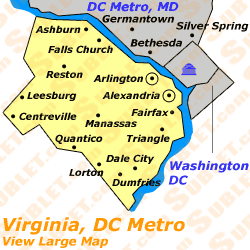(Authors’ Note: While the Jefferson Institute Journal published Mr. Gabriel Roth’s essay, “A Better Way to Improve Transit to Dulles,” before the Loudoun County, Virginia Board of Supervisors approved the county’s participation in the Washington Metrorail Silver Line by a 5-4 vote, it is instructive to offer this rebuttal in order to correct many of the missing or misrepresented elements in Mr. Roth’s analysis.)
Why do conservatives like Gabriel Roth (“A Better Way to Improve Transit to Dulles”) insist on betraying their conservative principles by pushing arguments against mass transit – in this case the Silver line to Loudoun County, Virginia – that don’t even pass the laugh test of the Washington Examiner?
In the first instance, Mr. Roth’s preference for express bus service between Wiehle Avenue and the Pentagon in less than 30 minutes is purely a figment of his imagination. The published express bus timetable from there to the Pentagon shows at least a 40-minute trip and presumes no congestion or other delays. Moreover, since there are no published timetables yet for the Silver Line, it is difficult to accept Mr. Roth’s authoritative suggestion that it will take 57 minutes on the Silver Line to go from Wiehle Avenue to the Pentagon. Current service between Vienna and the Pentagon, according to the Metrorail timetable, takes on average 33 minutes for the 11 stops along the Blue and Orange Lines. The Silver and Blue Line route from Wiehle Avenue to the Pentagon will have 12 stops; probably adding three to five minutes not the 20 or more minutes Mr. Roth imagines.
If Roth is thinking of express bus service from Loudoun County to the Pentagon, current service from Ashburn to the Pentagon takes at least 50 minutes according to published timetables. He is again placing hope on uncongested roads and no delays for his anointed express bus to deliver his passengers more quickly.
Unfortunately, Mr. Roth also complicates his credibility by suggesting that 1,200 express buses in the Dulles corridor could do a better job of moving commuters than the Silver line. Unless he is going to vanquish autos from the toll road to achieve this end, there will in fact be more congestion. Besides, it is rather hard to imagine 1,200 buses assembling in some undisclosed location in Loudoun County and swarming like bees across Northern Virginia in a futile attempt to reach a single destination in 30 minutes. While there is little doubt that limited point-to-point express bus service will continue to have a market in Loudoun County, Metro’s frequent, traffic-free service and access to myriad destinations throughout the region, provides a far superior choice for most Loudoun commuters. According the Washington Metropolitan Area Transit Authority (WMATA), as recently as 2009 there were nearly 30 million unlinked trips on Metrorail, the second highest ridership in the nation, and the numbers continue to grow.
The Silver line will provide commuters and travelers in the Dulles Corridor a travel option. Conservatives like having options. Additionally, the Silver line will help contain and/or reduce vehicle demand on the Dulles Toll Road and the Greenway. Conservatives like improving conditions that save time and money as well.
Regarding Mr. Roth’s concern about funding the Silver line, funding for transportation infrastructure is always tricky, especially since we’ve become so accustom to expecting the best for nothing. It’s heartening to know now that Loudoun County will follow the lead of Fairfax by establishing tax districts comprised of the commercial landowners around each of the stations planed in its jurisdiction. It is hoped too that Loudoun will join in calls for Federal participation and more state support for the project.
It is difficult to accept the argument that ridership on the Silver line will not be sufficient to meet Federal-support requirements. As has been shown on virtually all segments of the Metrorail system, capacity to handle future service demands is a major problem. Such are the rewards for success. Fortunately, the Silver line appears to have the capacity to handle ridership growth for the foreseeable future. Conservatives like solid advanced planning.
That said, toll road revenue has always been an element of the funding formula for this project going back at least 15 years. If tolls serve as an incentive to encourage people to ride the Silver line that would be even better. Conservatives call that a market-driven alternative. Then perhaps more of the funding for the project could be raised from the fare box. But the fact of the matter is that users of the toll road will benefit too from the presence of the Silver line. Is it not reasonable to ask toll road users to pitch in? And actually, when you think about it, the toll amounts Mr. Roth is concerned about in 2018 and thereafter are not really out of line if you think about the rate of inflation and the future upkeep of the corridor’s entire transportation system.
And how can we take seriously Mr. Roth’s suggestion that Metro will not foster economic development? Economic development is already occurring in the first phase of the Silver line extension even before it opens, and there are plans a-plenty by landowners near the proposed Loudoun stations that suggest growth and development, as well as tax district revenue, is not far behind. It’s really a matter of who are you going to believe: Mr. Roth, or your own eyes.
Look at what has happened all over the metropolitan region where Metro has been built…Arlington, Bethesda, and downtown Washington being good examples. Then look at those portions of the region where Metro was not built…Georgetown being a prime example. Talk to residents of Georgetown about how happy they are that 35 years ago the citizenry of Georgetown did not have the foresight to allow Metro to have a station there.
The research analysis of George Mason University’s Stephen Fuller was no myth. The potential for organizing Loudoun County’s economic development around future Silver line stations is a long term opportunity for Loudoun County to produce better, higher performing activity centers than would not be possible if Loudoun had passed up this opportunity to be part of the Silver line project. By Mr. Roth’s own admission, organizing high-density development around the Silver line stations will greatly reduce the development pressures on western Loudoun County…and that is exactly what folks on the western side of the county want.
Research has documented time and time again the ability of rail transit to spark, shape and direct development in a positive way. Rail also attracts development where it might not have occurred otherwise. Rail allows localities to direct development into areas that can adequately accommodate that development.
It’s a real shame that Mr. Roth feels the need to mimic the likes of Randall O’Toole and Wendell Cox to find a rationale for promoting the use of buses few people care to ride over fixed rail systems that are growing in ridership and promoting economic development all over the world, the nation and right here in our own backyard. Mr. Roth’s six arguments for buses and against rail are the same ones O’Toole and Cox drag out in every community around the nation that is contemplating building something other than more roadways to handle the burgeoning commuter challenge.
Fortunately, Loudoun County – like most communities elsewhere – has chosen to ignore the O’Toole/Cox line of argument, and instead stake its future on the Silver line.
Glen Bottoms serves as Executive Director of The American Conservative Center for Public Transportation. He is a retired federal executive, having worked for the Federal Transit Administration for twenty-five years. He can be reached at gbottoms@amconmag.com
Eric C. Peterson is a transportation policy consultant. Previously he served on the staff of former U.S. Senator John Warner (R-Va), was Deputy Administrator for the U. S. Department of Transportation’s Research and Innovative Technology Administration, and Executive Director of the Landowners Economic Alliance for the Dulles Extension of Rail (LEADER) – the entity that organized the tax district in the first phase of the Washington Metrorail’s Silver line extension to Dulles Airport and Loudoun County, Virginia. He can be reached at ecp50@verizon.net.






